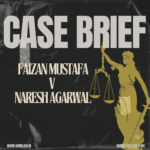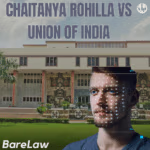Primary Details of the Case:

Case Brief on I.R. Coelho (dead) by LRs v. State of Tamil Nadu & Ors.
Introduction:
The Indian judiciary has performed its role to the fullest extent in order to ensure that justice is served according to the principles set out in the Constitution. These principles contain elements of great importance and hence any attempt to remove them would raise the question of whether we still have a constitution. It is clear from this case that judicial review and activism have an important place in India. For example, in the Lalita Kumari case, Supreme Court held that Judicial Review is one of the basic structures of our Constitution. Among such tools include protection of democracy by the legislature and executive from being diluted by this tool. This paper looks at another such instance when legislature- parliament used its amending powers to immunize laws which violated fundamental rights and basic structure doctrine thereof. Let’s discuss briefly about I.R.Coehlo (dead) by LRs v.State of Tamil Nadu & Ors.
Facts:
In fact, there was a reference order made by a five-judge bench to a nine-judge bench on 1999 IR Coelho v State of Tamil Nadu case seven years ago. In addition, it was made seven years back. The Gudalur Janmam Estates (abolition and conversion into Ryotwari) Act, 1969 vesting some forests lands in Janmam Estates in Tamil Nadu state were struck off earlier as they were found not within agrarian reforms covered under article 31A of Indian Constitution.Later West Bengal Land Holding revenues act of 1979 in the state of West Bengal was also said to be unconstitutional and struck down by the court.Subsequently these two laws were inserted into ninth schedule through thirty fourth as well as sixty sixth Constitutional amendments.This had been challenged before previous five judge bench.
The five-judge bench referred this matter for decision by nine-judge bench since they wanted Waman Rao case reconsidered as per which all acts added through amendments into ninth schedule must be struck down if it violates basic structure doctrine as held in Kesavananda Bharati case. This brought this case before the bench.
Issues:
The reference order from the five-judge bench had asked,
Are the laws or regulations which are included in the 9th schedule of Constitution on the ground that it is violative, destructive or detrimental to a fundamental rights or articles 14,19 and 31 should be struck down and not the amendment itself that would enable such inclusion?
This court has framed its important issue on,
Does legislature under article 31B have power to put legislations into ninth schedule even after basic structure doctrine and which will immunize them from fundamental rights or not, and if so whether court shall exercise judicial review over it or not?
Laws involved:
Article 14 – equal treatment under law
Provisions under Article 31A and Article 31B- these provisions of Indian Constitution allowed government to acquire private property for public purpose and article -31B introduced ninth schedule- which gives judicial immunity for any laws if brought under its ambit.
ARTICLE 368 – PARLIAMENTARY AMENDMENT AND PROCEDURE
ARGUMENTS:
There were the following contestations:
Petitioner was very strong in his argument that any act of immunizing any law by putting it into Ninth Schedule should not be allowed, especially after the decision of this court in 1973. This would not be compatible with the doctrine of basic structure of constitution. They also contended that there is an implied limitation on the powers of Parliament to amend the laws under Article 368 and thus immunity to any law from part 3 will give absolute power to parliament making it impossible to review it by another organ as well. Thus lastly, they referred to Justice Khanna’s opinion in Kesavananda Bharati case and argued that fundamental rights shall be part of basic structure doctrine as per Justice Khanna so ninth schedule laws should be subjected to Fundamental rights test.
On other side, respondent again relied on judgment in Kesavananda Bharti case and contended that Ninth Schedule is a constitutional device for protecting certain laws under its umbrella. They argued that judiciary forms part of basic structure but judicial review power vested with judiciary is not absolute which means only article 31B restricts judicial review power. Therefore, once it enters next schedule through amendment, there is immunity from Part III of Indian Constitution.
DECISION:
Court made following holdings:
Firstly, It was held that any such law which violates fundamental rights guaranteed under constitution has violated basic structure of constitution. This means even Part 3 must also form part of basic structure doctrine whereby any amendment or mere insertion of laws into Ninth Schedule shall be violative and invalidated by way of judicial review.
Secondly all such acts enacted or amended post-1973 judgment in Kesavanand Bharati case need to pass through the sieve of their conformity with articles 14,19,21 and other principles enumerated therein even if placed at different points within ninth schedule. The provisions contained in such laws shall be challenged on these grounds.
Finally, this court established the important principle called the ‘fundamental rights test’. As was alluded to earlier, ninth schedule laws should be subjected to articles found in part 3 of the constitution.
CONCLUSION:
From aforesaid case, it transpires that judiciary has been interpreted in such a manner so as to make checks and balances on executive laws made by it which somehow violate rights of citizens. Fundamental Rights tests have participated in an important mission of making sure that fundamental rights are not unreasonably taken away by a government at its whims and caprices.



